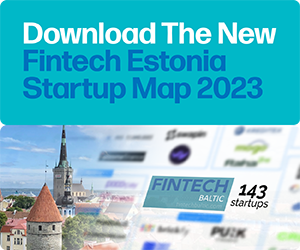In 2023, Lithuania fintech startups secured a mere EUR 7.2 million in venture capital (VC) funding, a figure which represents a staggering 97% year-on-year (YoY) decline from EUR 222.6 million, new data released by Dealroom show.
The sum makes fintech only the sixth top startup segment in Lithuania by VC funding volume for 2023, a far cry from the sector’s prominence in 2022 during which it stood at the second most funded startup vertical.

Top industries by VC investment volume in 2023, Source: The Lithuania startup ecosystem 2023, Dealroom, Feb 2024
The plunge in fintech funding mirrors the trends observed across the broader Lithuanian and global startup landscape. In 2023, Lithuanian startups funding declined by nearly 30% YoY, dropping from EUR 414 million in 2022 to EUR 292 million in 2023.

VC investment in Lithuanian startups, Source: The Lithuania startup ecosystem 2023, Dealroom, Feb 2024
Globally, VC investments fell to US$248.4 billion in 2023, the lowest level since 2017, with global deal volume tumbling 30% YoY to 29,303 in 2023, a six-year low, data from CB Insights’ State of Venture 2023 report show. The pullback is being attributed to the decline in mega-rounds, plunging valuations and a shift in investor behavior towards more cautiousness.

Global annual equity funding and deals, Source: State of Venture 2023, CB Insights, January 2024
Despite plunging funding volumes, Lithuania remains a dynamic startup hub. According to Dealroom, the combined enterprise value of Lithuanian startups grew by 7.1x between 2018 and 2023, against an average growth rate in Central and Eastern Europe (CEE) of 3.6x and a Baltic growth average of 2.7x, making Lithuania the fastest-growing startup ecosystem in the Baltic and broader CEE region.
Over the past year, Lithuania’s startup ecosystem has seen its share of the total enterprise value in the Baltics and CEE increase by 4% points and 0.5% points, respectively, showcasing the country’s rising prominence in the region’s startup landscape, the data show.

Ecosystem value growth of selected ecosystems, growth 2018-2023, Source: The Lithuanian startup ecosystem 2023, Dealroom, Feb 2024
Lithuania’s rising fintech sector
With 890+ startups and EUR 12.4 billion in combined ecosystem value, Vilnius alone accounts for 91% of the combined enterprise value of Lithuanian startups. Key sectors include fintech, information and communications technology (ICT), gaming as well as biotech and laser tech.
The sector comprises more than 170 startups, giving a share of 20% of all young tech ventures in Vilnius, data from Dealroom show, making fintech the biggest and most prominent startup vertical in the Lithuanian startup scene.
Among the city’s biggest fintech companies are Kevin., an account-to-account (A2A) payment services provider, and TransferGo, an international money transfer company, which Dealroom believes are on track to reach unicorn status. Rising stars that have secured notable rounds of financing and reached considerable valuations include HeavyFinance, a digital lending startup focusing on the agricultural sector; smeGO, an online lending platform for small and medium-sized enterprises (SMEs) across the Baltic; and Amlyze, a fraud prevention and compliance startup, which have secured notable rounds of financing and reached a considerable valuation.
The fintech momentum is projected to carry on in Lithuania this year onwards as the new 2023-2028 fintech strategy gives further impetus to fintech adoption. Released on October 23, the Guidelines for the Development of the Lithuanian Fintech Sector for 2023-2028 formulate directions and areas of focus for the development of the fintech sector in Lithuania within the next five years, setting out ambitious goals including reaching an annual sector turnover growth rate of 30% and 35 million customers spread out across companies licensed in Lithuania by 2028.
It also aims to have 70% of fintech companies in the country maintain a workforce of at least 10 full-time employees, and have at least eight foreign fintech companies establish a presence in Lithuania and commit to creating over 50 jobs within three years of establishment.
Baltic tech funding falls 38%
Baltic tech startups raised a total of EUR 730 million in funding in 2023, down 60% from the all-time record of EUR 1,827 million secured in 2022, according to the latest Baltic Startup Funding Report by Firstpick and Change Ventures.

Total capital raised by stage, Source: The Lithuanian startup ecosystem 2023, Dealroom, Feb 2024
In 2023, Estonia continued to hold a market leader position in all major categories, accounting for 60% of pre-seed and seed funding rounds and 62% of Series A and growth rounds in the Baltics in 2023. However, Latvia’s and Lithuania’s early-stage activities are continuing to grow. This will prompt the emergence of a more competitive landscape in the coming years, the report says, leading to more significant advances in later funding stages in these countries as they emulate Estonia’s development patterns.

Number of funding rounds by Baltic country, Source: The Lithuanian startup ecosystem 2023, Dealroom, Feb 2024
Featured image credit: Edited from freepik








No Comments so far
Jump into a conversationNo Comments Yet!
You can be the one to start a conversation.